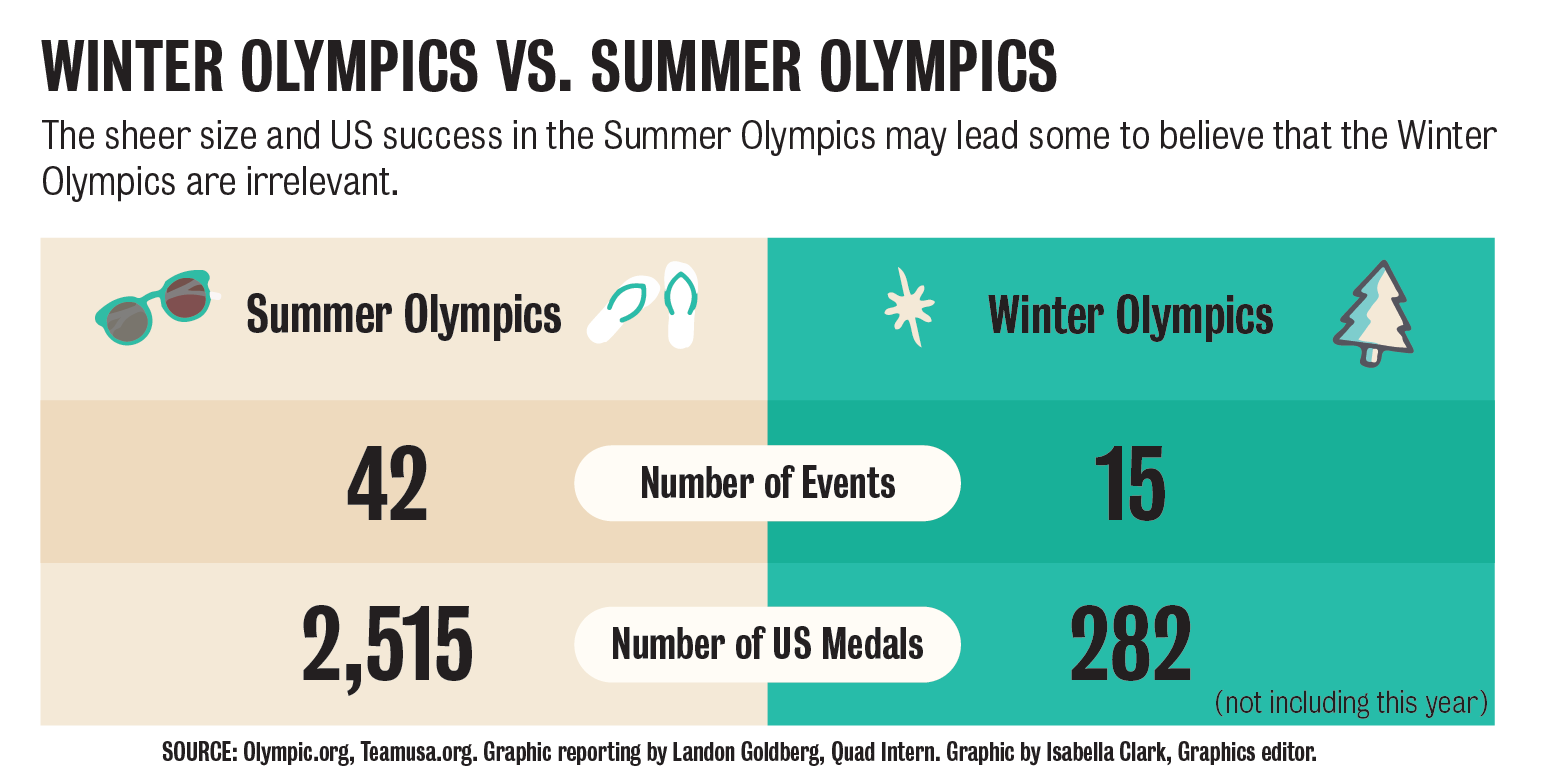The Quad: Why you should care about the Winter Olympics

By Landon Goldberg
Feb. 25, 2018 12:48 p.m.
The score was tied 7-7, heading to the last attempt of the last end.
The tension in the air was so palpable, it could cut through the very ice below it.
The four-time Olympian stared at his target intently, crouched down, crept forward and released the stone. The dozens in the stands roared in anticipation as one Matt Hamilton swept ferociously away, him and his teammates doing everything in their power to will their way to victory. As the stone glided down the ice, the Canadians looked on helplessly, knowing the fate of the match was no longer in their hands. The stone inched its way towards the house, abetted by the lightning-quick movements of the sweepers.
After the journey of an eternity, filled with gliding, sweeping and a whole lot of curling, the stone had struck its target impeccably, nudging the Canadian stone off the target and securing the daring upset of the back-to-back-to-back gold medalists for the U.S. men’s national curling team.
If this saga of drama and intrigue hasn’t fully convinced you to stop studying for your midterms, call your mother, inform her you’re dropping out of school and moving to Wisconsin to train to be an Olympic curler and buy a crazy pair of pants, I understand.
It’s true – the Winter Olympics might not be as cool as the Summer Olympics, which tend to feature such athletes as near and dear to our hearts as Simone Biles and LeBron James. There aren’t as many sports the average person is familiar with at the Winter Olympics. And the United States teams certainly do not achieve the success they do at the Summer Olympics.
The prevailing sentiment on campus seems to be that the Winter Olympics are somehow a joke, the sports themselves too esoteric to understand and too boring to watch.
“I don’t care enough about any of the sports at the Winter Olympics to watch,” said Pratishta Natarajan, a second-year psychology student.
Comparisons to the Summer Olympics are inevitable, with the Winter Olympics almost never faring as well in the eyes of the public.
“The Summer Olympics have better events that don’t involve shaving ice,” said Michael Schmeltzer, a first-year philosophy student.
Shaun White’s gold medal-winning run in the men’s halfpipe was historic. Alina Zagitova, a 15-year-old competing in the games from Russia, broke the world record in a short program for women’s figure skating, a record that had been set minutes earlier by her training partner and fellow 18-year old Russian Olympian Evgenia Medvedeva. Then there is the story of Elizabeth Swaney, who at 33 years of age finally achieved her dream of competing in the Olympics, despite barely knowing how to ski.
“The Winter Olympics are nice, because the U.S. gets knocked down a peg and people need to understand that it’s not just about winning, it’s about the countries coming together,” said Tara Ostad, a second-year physical science student.
What some students and apparently the country are failing to realize is the Olympics, no matter summer or winter, are about so much more than just the individual athletes competing for their respective countries. They are a staggering display of unity and peace at a time when everywhere else we look, we see division. This message carries particular weight in today’s precarious political climate. One need not look further than where the games are being held to see the potential of the Olympics as a tool for societal change, with South Korean and North Korean delegates using the event as an opportunity to meet peacefully in Pyeongchang to discuss the politics and atrocities that have divided their people and their peninsula for so long.
If North Korean and South Korean diplomats can talk of a United Korea; Indian and Pakistani athletes can compete side by side; and an athlete from South Korea, a nation once under colonial rule for 35 years by Japan, can embrace an athlete from their former colonizer, then it gives me hope that perhaps one day a Democratic and a Republican lawmaker in our nation’s capital can together put aside their differences to work together for the betterment of this country.
As this year’s edition of the Winter Olympics come to a close, I do not ask nor expect you to suddenly embrace the sport of skeleton racing. I understand the World Curling Championships will probably never be broadcast on ESPN. And, although Shaun White shreds on the halfpipe, he’s also got some off-the-course issues.
The 2018 Pyeongchang Winter Olympics are nowhere near perfect, neither in entertainment value nor morality of the athletes competing. What they have been – and what I hope everyone who’s watched even one minute of one event can recognize and appreciate – is full of connections made between those who look, think and act differently, at a time in history when it has never been more critical to do so.


